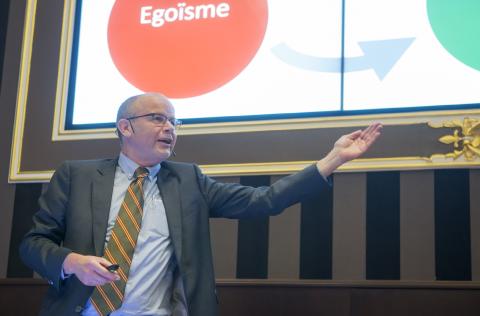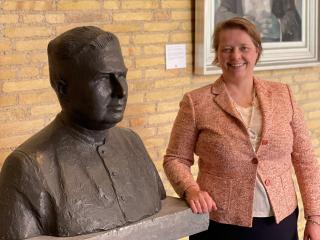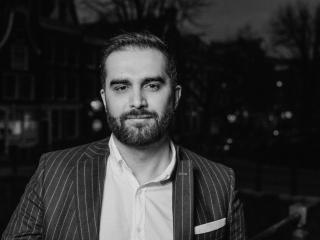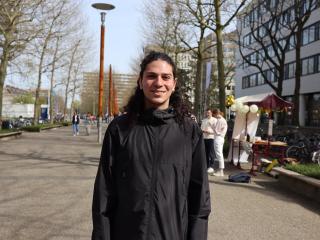“The archetype of the self-centered human is outdated”
With its focus on material wealth and the rational human, economics education in secondary schools is behind the times. Lans Bovenberg (63) says that it should be more inspiring and socially relevant. He worked on a new teaching method for secondary education for six years. We talked to him about his fascination with his profession and what he wants to change. “A well-functioning household revolves around love; that is the nomos of the oikos.”
“Economics”. Lans Bovenberg says this word with great affection, as though it is the name of a childhood sweetheart who continually charms him anew. He also looks at it through rose-tinted glasses a bit. Bovenberg views economics as “the art of collaboration”. In his opinion, the ultimate miracle of humanity is how much we manage to achieve by collaborating. “Bartering is in the essence of our being,” he says, referring to Adam Smith. This Scottish moral philosopher and economist stated that collaboration is the source of our wealth and happiness. Like his idol, Bovenberg believes that we are social creatures who flourish by collaborating. He says that we can use it to resolve challenges in our family, organizations, countries, or even globally. The Tilburg professors would like more people to have this positive outlook — young people especially. This was one of the reasons to devote the last ten years of his career to reforming economics education in secondary schools.
How did your love for economics come about?
“I grew up in a Reformed Protestant household where the emphasis was on social commitment. My father was active in politics for the Anti-Revolutionaire Partij (anti-revolutionary party) and my mother did a lot of volunteer work. This was infectious. I was also interested in society, and I am also rather brainy. This is why I wanted to use my intellectual talents for a better world. The founder of econometrics, my great role model Jan Tinbergen, showed me that you can combine science and social commitment. I try to level the science and the social out: the balance of Lans.”
We need both the scientific and the social?
“Yes. Mathematics is a wonderful language for precise reasoning and comprehending the essences of social issues. Without that scientific basis, economics will become a glorified civics class. We should not want that. Neither should we want economics with models without social context.”
You are of the opinion that economics education is outdated and should better connect with the experience of young people. How old-fashioned is it?
“A lot has changed in the economic sciences over the past 20 years. Unfortunately, not all those insights have made it into secondary education yet. Current economics classes in secondary education are still based on old human archetypes, for example.”
Are ideas about the role that psychology plays in human decision-making, such as by Daniel Kahneman, not yet part of the curriculum?
“Regrettably, those are not yet represented. The dominant human archetype is still the homo economicus: the rational, calculating, self-centered human. It is an artificial construct that most people, and certainly young people, feel does not represent them and one that also attracts increasing criticism in science.”
Isn't economic theory also overly money-oriented? I read that you think that the balance of money and life is too often tipped towards money...
“That is true, but the focus on material wealth is also understandable. When most people lived in severe poverty, the priority was material wealth. Now that collaboration has created an enormous amount of material wealth, it is logical to increase the focus on other values, such as the livability of the planet.”
Material wealth stands proud as a priority everywhere, but values such as democracy, equality, and livability are under pressure... How are we doing? Do we still have time?
“The glass is half-empty and half-full. If people could decide when and where they were born, then they would often choose now and the Netherlands. Economics as a collaborative project for the creation of wealth has been very successful. For a great many citizens of the world, life has changed from short and cruel to long and comfortable.”
And why is the glass half-empty?
“We have three challenges: The first is sustainable development. We have become wealthy in the West due to an ingenious and complicated collaboration. A drawback to this is that we are depleting and polluting the earth. To turn this around, a fundamental change in the economy is needed. That is also complicated: a massive, complex challenge.”
That complexity is also why not everyone can participate anymore...
“That is the second challenge we face: inclusivity. The sense of inequality is growing. You notice that a group of people are turning away from society. These people feel that they are not profiting enough from our society, but the core of a good collaboration is that everyone profits sufficiently.”
This makes me curious to hear about the third challenge...
“It is the mental pressure experienced mainly by young people. We are also the victims of our own success here. With so many options, it is difficult to choose; that is causing stress. Furthermore, in the prosperous West, we have difficulty dealing with things that go wrong. Failure is no longer allowed; forgiveness is out. Many people think that they are responsible for their own success, that they have to earn the love of other people. This urge for perfection also causes a lot of stress. A more humane economy should have more appreciation for our imperfections and limitations: this is exactly why we need each other so much.”

Nu samenwerking enorm veel materiële welvaart heeft gecreëerd is het logisch om meer naar andere waarden te kijken, zoals de leefbaarheid van de planeet.
Lans Bovenberg
What human archetype should be used instead?
“In economic science, partly thanks to Kahneman, a less rational human archetype is emerging. We view mankind more as limited beings who make mistakes and has emotions. Based on that knowledge we can help people to make better choices in the future, such as about their money and health. You cannot resolve that with freedom of choice and market forces.”
Mankind is also more social than economists assume at the moment, right?
"Yes, humans are attached to many other values besides material self-interest. This includes values such as justice and reciprocity. Humans appreciate good collaboration as an independent goal and not only as a means to material prosperity. But economics education is not yet about this, while young people could really benefit from it. In the new method for economics education the limited nature of the individual and the social nature of mankind are central”
How will you ensure that young people understand economics better and become interested?
“By telling one story instead of the fragmented way in which the current methods do this. The overarching narrative is: collaboration is unbelievably valuable but unbelievably difficult at the same time. We want to help pupils gain control of their own lives and society.”
Along what lines does the method continue?
“The idea that collaboration is based on reciprocity: I do something for you, you do something for me. Both our interests are counted: no person is nothing, but they also are not everything. We will review when interests are “balanced” and “unbalanced” and how we can get them “more balanced”. There are three instruments for the latter: coercion, competition, and voluntary adherence to enduring relationships and ethics. You need all three, but because collaboration is becoming increasingly complex, the focus will increasingly be on the last one.”
You have the best intentions, but does education reform not start from the bottom?
“Education has had to deal with a lot already, so change should happen on the work floor. That is why we have developed the method with a team of teachers. We are now testing it at secondary schools.”
How do you want to persuade teachers to change their ways?
“I want to awaken the passion for the subject with a kiss. There is enormous potential, but it is not always tapped. This has to do with the teaching method, teacher shortage, and lack of time. It is also unfortunate that economics is mostly taught to upperclassmen, which means that the main focus is on exams. Instead, you would like education to help young people better understand the world and to better manage their own lives as economics is reflected in almost all important life choices.”
What is the main thing that you want to teach young people about collaboration?
“We are at a crossroads. Will we choose more control and competition or more trust? I hope for the latter as that is what you need in complex modern economy. We must give each other the trust and the freedom to make mistakes. In this way, we can find new solutions. A well-functioning household revolves around love; that is the nomos of the oikos. Having the courage to trust others, even when things can go wrong, is the essence of love.”



